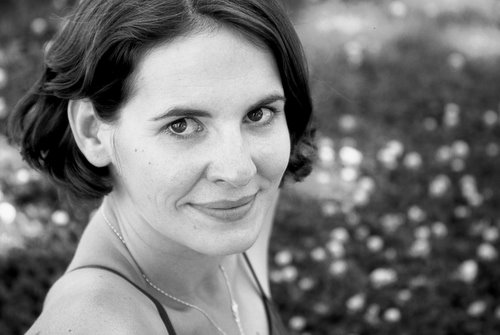...being the seeing.
Meditative awareness is an alert, empty, watchful consciousness for living all of life, without interference by conditioned, prejudiced, thought forms.
from Patanjali Now, Foster Walker
Friday, April 6, 2007
Meditation is...
Monday, February 26, 2007
A story about Ahimsa
A certain sadhu, or wandering monk, would make a yearly circuit of villages in order to teach. One day as he entered a village he saw a large and menacing snake who was terrorizing the people. The sadhu spoke to the snake and taught him about ahimsa. The following year when the sadhu made his visit to the village, he again saw the snake. How changed he was. This once magnificent creature was skinny and bruised. The sadhu asked the snake what had happened. He replied that he had taken the teaching of ahimsa to heart and had stopped terrorizing the village. But because he was no longer menacing, the children now threw rocks and taunted him, and he was afraid to leave his hiding place to hunt. The sadhu shook his head. "I did advise against violence," he said to the snake, "but I never told you not to hiss."
Protecting ourselves and others does not violate ahimsa. Practicing ahimsa means we take responsibility for our own harmful behavior and attempt to stop the harm caused by others. Being neutral is not the point. Practicing true ahimsa springs from the clear intention to act with clarity and love. From the Yoga Journal
Non-Attachment
"The superior man makes the difficulty to be overcome hisfirst interest; success comes only later."--Confucius
Sounds like Patanjali’s “Don’t be attached to the Outcome” to me!
Wednesday, February 14, 2007
Practical Hint in Raised Arm Pose
- having a block in between the palms, or
- a strap around the elbows.
- ground through your feet
- Calves move forward
- Knee Caps lift
- Inner thighs rotate backward
- Tailbone drops
- Extend both sides of the trunk equally
- Front ribs stay in
- Shoulders drop
- Throat relaxed
- Gaze relaxed
On a side note :)
Inversions and Twists Class
 Marichiasana III
Marichiasana III
Downward Dog – head resting on a block (Note: move neck and shoulders away from the head)
Handstand – with strap on forearm below elbow
Forearm Stand (with block and strap against the wall)
Forearm Stand with palms facing up and sandbags on palms.
Sirsasana III (against the wall – hands clasp elbows – do both sides)
Gomukasana (hands only; then feet as well)
Marichiasana III (binding – both sides)
Ardha Matsyendrasana
Ardha Padmasana (Dandasana – left leg straight, right leg in Padmasana, right hand binds on the back clasps the shin of the right leg, left hand holds the left foot on the pinky side)
Maha Mudra
Salamba Sarvangasana
Sarvangasana (clasping hands – press down arms)
Sarvangasana (hands over head)
Sarvangasana (hands at your thighs)
Setu Bandasana
Savasana
Sunday, January 28, 2007
Class on Jan 28
Tadasana
Tadasana with block between thighs - focusing on the inward rolling action of the upper thighs and the taking in of the tailbone
Also: lifting toes to really ground on all four corners of the foot at the same time
the bottom of the shoulders press into the body - lift the chest
Urdhva Hastasana
eyes of the elbows look towards each other - outer elbows to inner elbows
then with strap - just above the elbows to get a feeling of the elbow action
Tree Pose
right knee bent - knee towards the back - lift the pubis, tuck the tailbone, roll in thighs, compact the left hip, rotate navel slightly to the left
Utkatasana
rolling in the thighs, tucking the tailbone - lift the chest.
Baddha Konasana against the wall
Janu Sirsasana - tail bone in - roll upper thighs back - press through the top of the heel
Setu Banda on a bolster and with a strap against the wall
Savasana
Sunday, December 3, 2006
Norman's without Norman
Norman is in India, so Shane and Danielle have taken over his class. Rebecca and I went to the Saturday class - Forward Bends. It's like a Norman lite class - similar sequence - gentler adjustments ;-)
20 min headstand - the longest I seem to be able to do a headstand is about 5 min. My upper back or neck start hurting - I certainly don't want to risk injury! The two major things I focus on right now are:
placing the crown of the head on the floor: in the past I was too much on my forehead - which translated in neckpain - non alignment.
Lifting the shoulders towards the ceiling: it helps to open my chest and strenghtens my upper back. Slowly I am getting awareness in this area. It feels like the spine is sinking into the body - towards the front of the body - it's a neat feeling!
Plow Pose - straight back
20min shoulderstand + variations
one foot towards the ceiling - one foot towards the floor - lengthen
one footed drop backs into bridge
Plow Pose
A hip stretch - right leg bent at the knee - foot at the groin. The other leg is bent too - foot is placed about a foot in front of the other ft. Front foot lines up with the ankle of the right foot. Lean slightly forward to open the hips.
Janu Sirsasana Twist
Janu Sirsasana - stretch hamstrings
Dandasana
Parivrtta Janu Sirsasana
Dandasana
Paschimottanasana
Purvottanasana
Savasana



